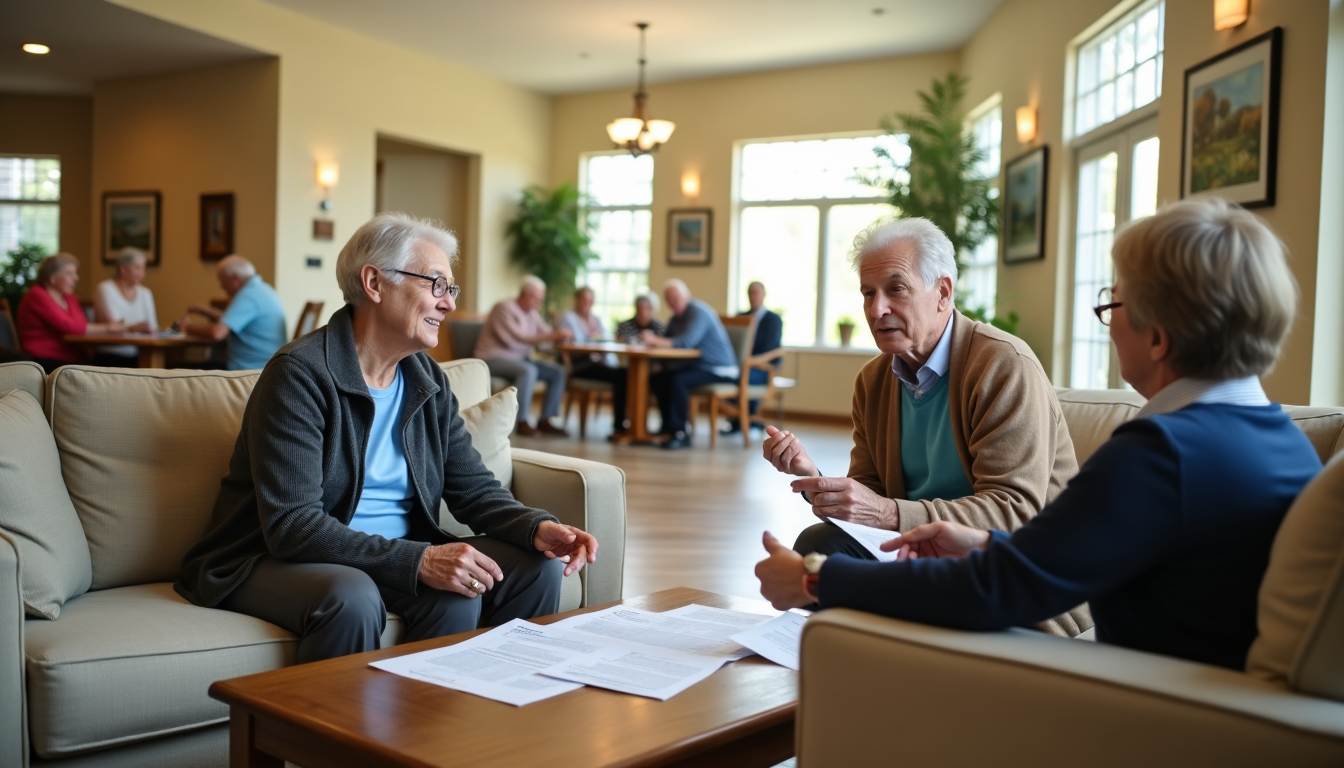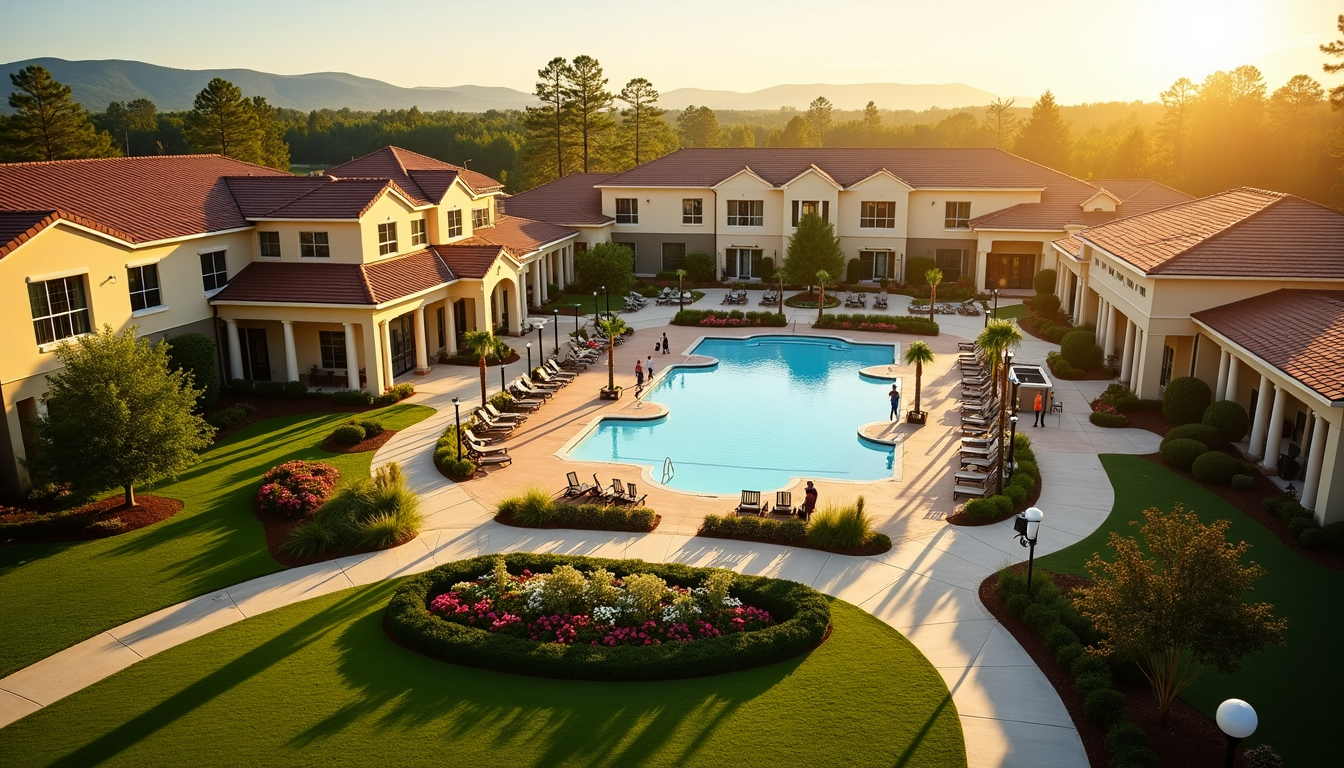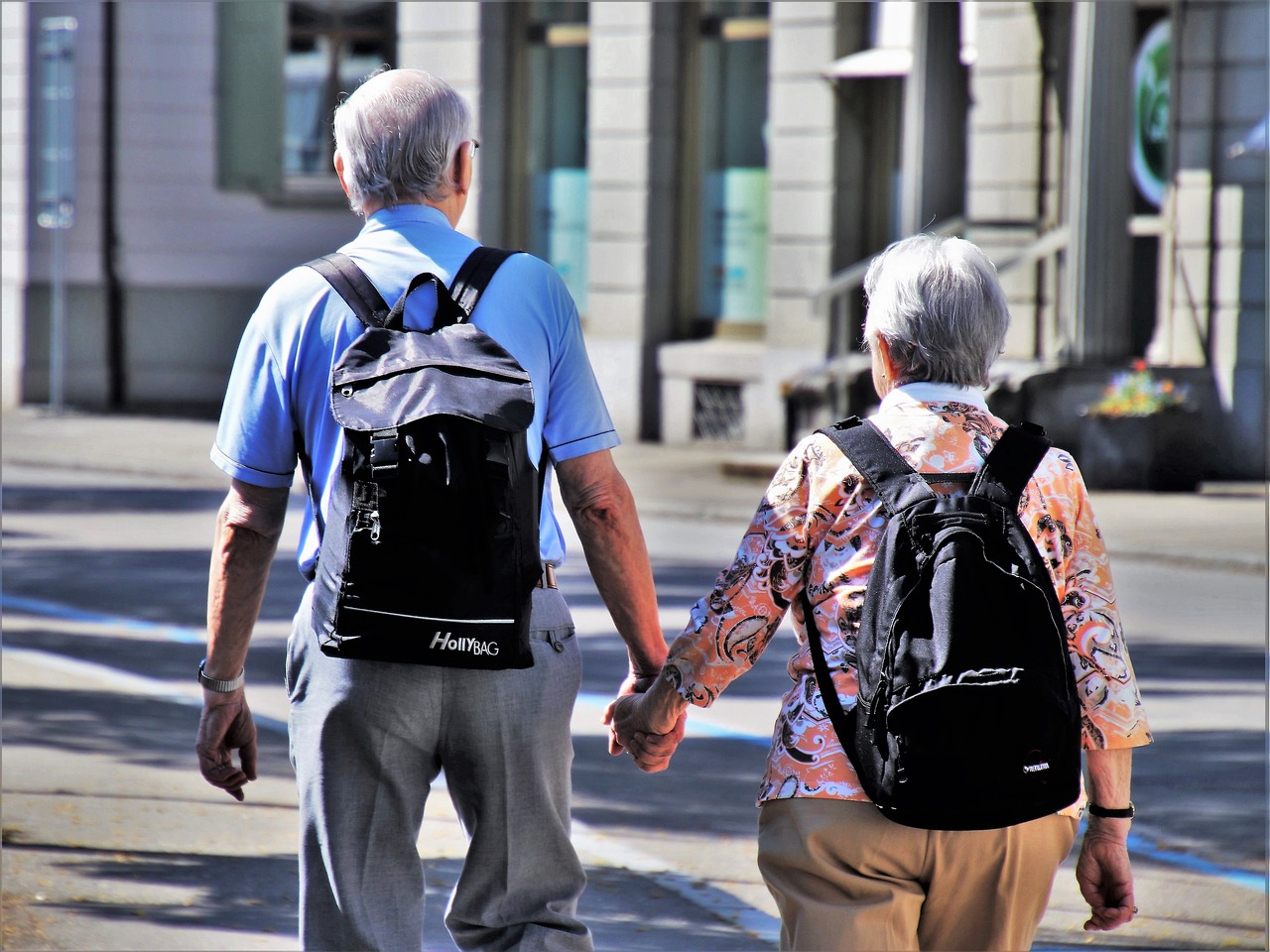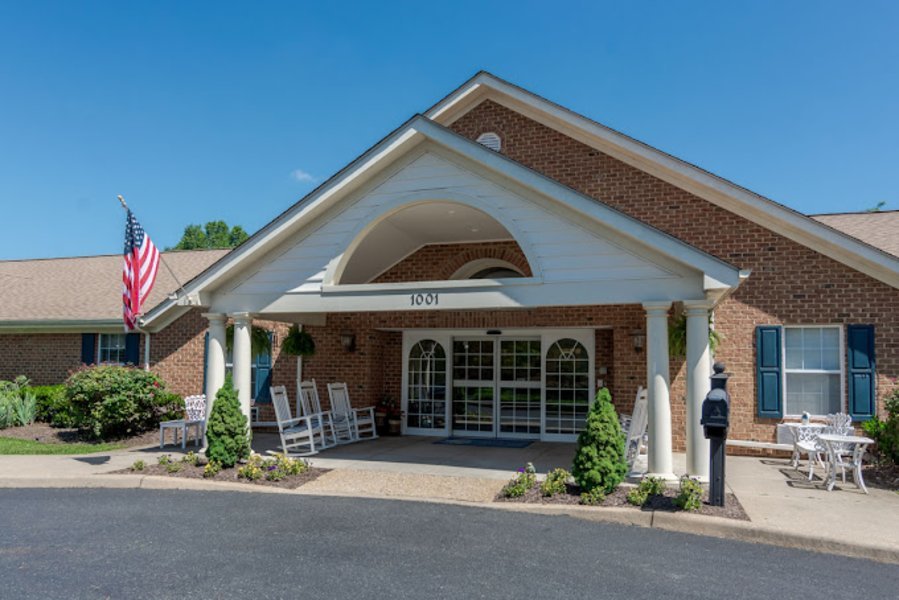Massachusetts faces mounting pressure on senior housing resources as demographic projections show residents aged 60 and older will make up 25% of the state’s population by 2030. The Boston Housing Authority, New England’s largest public housing provider, currently serves 58,000 residents across its properties, yet demand continues to outpace availability.
Most low-income seniors living in subsidized housing pay 30% of their income toward housing costs. Local housing authorities set specific income limits based on household size and location, determining eligibility for various assistance programs.
The state’s housing agencies maintain eight distinct programs targeting elderly residents’ housing needs. These options range from rental assistance vouchers to income-restricted apartments and supportive housing services, each designed to address different aspects of senior housing accessibility.
Massachusetts Rental Voucher Program (MRVP)
Massachusetts Governor’s office proposes $253 million for the state’s Rental Voucher Program in 2025, marking a $34 million increase from last year’s funding. The program helps elderly residents secure housing through two distinct voucher types.
Mobile vouchers follow tenants rather than properties, allowing seniors to choose any residence meeting state sanitary codes. The subsidy varies by zip code and voucher size, providing flexibility for health-related moves or family proximity needs.
Project-based vouchers remain tied to specific housing developments. Recipients maintain their subsidy only while residing in the designated unit. Both voucher types cap tenant contributions at 30% of monthly income.
Household income cannot exceed 80% of the Area Median Income for MRVP eligibility. Program data shows most current recipients earn below 30% AMI. Many waitlisted seniors spend 40-50% of income on rent, risking housing instability.
The program accepts applications from:
- Individuals
- Families
- People with disabilities
- Elders
Each applicant undergoes eligibility screening.
CHAMP, the state’s centralized housing portal, processes MRVP applications online. Local housing agencies also accept paper applications. Applicants must document:
- Income and assets
- Household members
- Current housing
- Massachusetts residency
Applications join authority-specific waitlists after submission.
Currently, 585,000 Massachusetts households qualify for rental help based on income. Only 250,000 receive any housing assistance. Housing authorities recommend:
- Early application submission
- Immediate response to communications
- Regular status checks through CHAMP
- Applications to multiple locations
Homeless applicants may qualify for priority processing. The Leased Housing Gateway Team (617-425-6611) provides application assistance.
Section 8 Housing Choice Vouchers
The U.S. Department of Housing and Urban Development (HUD) funds Section 8 vouchers throughout Massachusetts, letting seniors choose their housing while receiving federal rent support. The Section 8 Housing Choice Voucher Program operates differently from state-specific initiatives, offering broader housing options.
Tenants receive assistance through two distinct channels. Housing Choice Vouchers move with residents between properties, while Project-Based Section 8 subsidies remain tied to specific apartment communities. Both programs cap tenant rent at 30% of monthly adjusted income.
Massachusetts Section 8 applicants face specific eligibility requirements. Income limits range from 50-80% of regional median income. Single-person households qualify with incomes up to $28,950 in some areas, while two-person households may earn up to $33,100.
Properties often designate units specifically for residents aged 62 and older. Applicants must show U.S. citizenship or eligible immigration status and typically live within their chosen housing authority’s jurisdiction. Housing authorities screen adult applicants through criminal background checks and landlord references.
The application process starts at local housing authorities, found through HUD’s website. Applicants submit forms online or on paper, providing:
- Personal identification
- Income documentation
- Social Security numbers
- Citizenship proof
- Current housing information
- Landlord references
Most applicants join waitlists ranging from 1,200 to 13,000 people [32, 33]. The Executive Office of Housing and Livable Communities (EOHLC) closed its mobile voucher waitlist on January 13, 2025.
MassHousing lists Section 8 properties by city and town. Communities fall into two categories:
- Elderly/disabled restricted properties
- Open-access properties serving all eligible residents
Specialized developments like Hanover Legion offer 60 Section 202 program units with Section 8 subsidies. Starting March 1, 2024, voucher amounts reflect zip code-specific rents rather than metropolitan averages. Massachusetts maintains over 300 income-restricted senior communities. Property managers provide current availability details and application procedures.
Public Housing through Local Housing Authorities
Massachusetts state-funded public housing maintains 41,500 apartments for elderly residents, veterans, and people with disabilities. More than half these units serve residents over 60 and individuals with disabilities.
Local Housing Authorities (LHAs) offer three distinct housing types. Standard elderly housing provides traditional apartments across the state, with the Boston Housing Authority serving nearly 9% of city residents. Congregate housing offers private bedrooms while residents share kitchen and living spaces. The state’s supportive senior housing program delivers assisted-living care within public housing units.
State-funded public housing requires household incomes below 80% of Area Median Income (AMI). Current income limits reach:
| Household Size | Income Limit Range |
|---|---|
| 1 person | $61,350 – $91,400 |
| 2 people | $70,100 – $104,450 |
Income thresholds vary by location, though most authorities follow HUD’s standardized limits. Residents typically pay 30% of income toward rent.
Waitlists stretch 3-5 years, but priority status speeds placement. Priority categories cover:
- Homelessness
- Disaster displacement
- Condemned housing
- Domestic violence
- Government action
- Medical emergencies
Elderly residents gain additional priority for:
- Paying over 50% of income toward housing costs
- Facing no-fault eviction
The Common Housing Application for Massachusetts Programs (CHAMP) processes public housing applications. Initial requirements include:
- Email address
- Mailing address
- Income estimates
- Social Security numbers
- Birth dates
Document uploads come later in the process. Multiple authority applications improve placement chances. Local residents and veterans receive preference points. Housing authorities provide reasonable accommodations for disabilities.
Applications require yearly CHAMP login or agency contact to remain active. Two years of inactivity closes applications.
Supportive Senior Housing Initiative
Massachusetts combines affordable housing with care services through its Supportive Senior Housing Initiative. The program serves 8,800 residents across 61 locations statewide, offering an alternative to nursing home placement for elderly residents with moderate care needs.
Resident Service Coordinators provide basic services at all locations:
- Community building
- Resource coordination
- Benefits management
- 24-hour supervision
- Medication monitoring
- Social activities
- Group meals
Additional services target residents needing extra support:
- Personal care assistance
- Housekeeping
- Laundry
- Shopping help
- Medical transportation
Dedicated staff coordinate post-hospital care and recovery services at each location.
Program eligibility requires:
- Age 60+ or qualifying disability
- State-supported public housing qualification
- Income below 80% of area median
- One person: $61,350-$91,400
- Two people: $70,100-$104,450
Asset values don’t affect eligibility. Individual properties may set additional requirements.
The payment structure divides into two tiers:
Tier 1 basic services come included with subsidized rent.
Tier 2 enhanced services operate through:
- Free provision for eligible residents
- Sliding scale fees for others
Monthly costs range $2,000-$7,000, below typical nursing facility rates. Programs like GAFC, SCO, and PACE may reduce costs for qualifying seniors.
MassOptions ((800) 243-4636) provides referrals weekdays 9 AM-5 PM. Properties handle tenant selection directly. Aging Services Access Points offer additional housing connections.
Current locations include:
- Elm Terrace, Greenfield: 108 units
- Highland Village, Shelburne Falls: 46 units
- Sanderson Place, Sunderland: 33 units
The Executive Office of Housing and Livable Communities partners with Elder Affairs to expand aging-in-place options statewide.
PACE Program Housing Support
MassHealth and Medicare jointly administer PACE (Program of All-inclusive Care for the Elderly), combining healthcare with housing support for Massachusetts seniors. The National PACE Association reports 95% of participants successfully remain in their communities rather than moving to nursing facilities.
Healthcare teams coordinate services at PACE centers and participants’ homes. Doctors, nurses, social workers, and personal care attendants address both medical needs and housing stability concerns . Massachusetts PACE centers maintain partnerships with housing providers, creating dedicated units for program participants.
Program eligibility requires:
- Age 55 or older
- Residence in PACE service area
- State certification of nursing home-level care needs
- Current community residence
- Ability to live safely with PACE support
MassHealth enrollment isn’t required for PACE participation. Seniors with incomes below 300% of federal benefit rate and assets under $2,000 may qualify for MassHealth premium coverage.
PACE provides in-home services including:
- Meal preparation
- Housekeeping assistance
- Physical therapy
- Personal care
- Medical equipment
- Safety assessments
Summit ElderCare partners with Sunset Towers and Colony Retirement Homes in Worcester. Element Care PACE works with Beverly’s Harborlight House. Hillside Residence integrates PACE services on its West Springfield campus. Everett’s Therese development reserves units for Neighborhood PACE enrollees.
Medicare and Medicaid-eligible participants receive services without premiums or copayments. This structure makes PACE financially accessible for low-income Massachusetts seniors seeking community-based care.
Home Modification Loan Program
Massachusetts offers zero-interest loans up to $50,000 through its Home Modification Loan Program (HMLP), helping seniors adapt their homes for accessibility needs . Property owners can modify homes without monthly payments, repaying loans only when selling or transferring title [100, 101, 102].
HMLP funds specific accessibility improvements including ramps, stair-lifts, bathroom adaptations, and doorway widening . The program also covers sensory integration spaces, hard-wired alarms, and safety fencing. All modifications must address documented disability or functional limitations.
Manufactured home owners qualify for loans up to $30,000 . Landlords with fewer than 10 units can access 3% interest loans when modifying units for eligible tenants.
Program requirements include:
- Massachusetts residency
- Age 60+ or documented disability
- Income qualification
- Demonstrated modification need
Regional provider agencies process applications . Applicants must secure contractor bids and pass home inspections before loan approval [105, 106, 107]. Program construction monitors oversee modifications, ensuring proper completion.
Additional modification resources supplement HMLP funding:
- Massachusetts’ OAHMP provides $5,000 in free modifications for seniors 62+
- USDA Section 504 offers $40,000 loans and $10,000 grants
- MassHealth covers select modifications through Medicaid waivers
Residential Assistance for Families in Transition (RAFT)
Massachusetts seniors facing housing crises receive emergency support through RAFT, a homelessness prevention program funded by the Executive Office of Housing and Livable Communities. The program provides up to $7,000 per year for housing emergencies.
RAFT funding covers immediate housing needs including:
- Past-due rent or mortgage payments
- Utility bills with disconnection notices
- Security deposits
- Moving costs
Program data shows RAFT saved Massachusetts $21 million compared to shelter expenses in FY14. Emergency shelter stays typically cost $3,000 monthly and extend eight months.
Seniors qualify for RAFT assistance by demonstrating:
- Income below 50% of Area Median Income
- Active housing crisis like eviction or foreclosure
- Risk of homelessness within 30 days
Immigration status doesn’t affect eligibility. The Massachusetts Emergency Housing Payment Assistance Application processes RAFT requests. Required documents include:
- Photo identification
- Eviction notice for rent assistance
- Housing documentation
- Income verification
Landlords must submit corresponding paperwork within 21 days of tenant applications.
RAFT’s impact shows through recipient outcomes. Data reveals 93% of families helped in FY13 needed no additional assistance the following year. The program’s targeted support prevents seniors’ displacement from their communities through early intervention.
MassHousing’s Elder 80 Program
MassHousing’s Elder 80 Program preserves affordable rental housing for seniors across Massachusetts. The program extends Section 8 Housing Assistance Payment contracts for 20 years while funding property improvements.
Randolph’s Simon C. Fireman Community demonstrates the program’s scope. MassHousing provided $27.3 million to renovate 160 apartments. Improvements include:
- Accessibility upgrades
- Building-wide Wi-Fi
- Enhanced fire alarms
- Sprinkler systems
Applicants must meet income and age requirements:
- Earnings below 80% of Area Median Income
- Age 62 or older
- Additional criteria for properties with combined state-federal funding
Current income limits reach $82,950 for single residents and $94,800 for two-person households in some areas.
Massachusetts Elder 80 properties include:
- Millbrook Park, Rockport: 80 subsidized units
- Pigeon Cove Ledges: 30 one-bedroom apartments
- Rockport High School Apartments: 31 fixed-income units
The Common Housing Application for Massachusetts Programs (CHAMP) processes Elder 80 applications. Housing authorities recommend:
- Multiple property applications
- Early submission for waitlist placement
- Regular application status checks
- Documentation readiness for income, identity, residency verification
Comparison Table
| Program | Type | Income Limit | Benefits | Eligibility | Application |
|---|---|---|---|---|---|
| MRVP | Rental Assistance | 80% AMI | Mobile/Project vouchers; 30% income rent cap | MA residency; Income limits | CHAMP portal, housing agencies |
| Section 8 | Federal Rental Aid | 50-80% AMI | Housing choice; 30% income rent | US citizenship; Regional income limits | Local housing authorities |
| Public Housing | Direct Housing | 80% AMI | Standard/Congregate/Supportive units | Age 60+/disabled; Income limits | CHAMP system |
| Supportive Housing | Service Housing | 80% AMI | On-site care; Meals; 24-hour staff | Age 60+; Public housing qualified | Direct to properties |
| PACE | Care & Housing | 300% federal rate | Home services; Healthcare; Maintenance | Age 55+; Nursing care need | PACE organizations |
| Home Modification | Property Updates | Region-based | $50,000 zero-interest loans | MA resident; Age 60+/disabled | Regional providers |
| RAFT | Emergency Aid | 50% AMI | $7,000/year crisis support | Housing crisis; Income limits | Online emergency application |
| Elder 80 | Senior Development | 80% AMI | Long-term units; Safety upgrades | Age 62+; Income limits | CHAMP system |
Conclusion
Massachusetts housing authorities manage eight senior housing programs targeting different affordability challenges. Local agencies process applications for rental vouchers, public housing units, supportive services, and emergency assistance through centralized systems.
Program waitlists stretch several years, requiring advance planning from applicants. Housing authorities report consistent documentation needs across programs:
- Income verification
- Age confirmation
- Massachusetts residency proof
- Asset documentation
- Housing history
The state’s 2025 budget increases funding for senior housing initiatives. Recent changes streamline application processes through the CHAMP portal while expanding support services at housing sites. Local authorities now process applications faster through digital systems.
Housing counselors recommend applying to multiple programs simultaneously. Early applications improve placement chances as authorities typically process requests chronologically. Regular contact with housing agencies helps track application status and identify new opportunities.
Massachusetts continues expanding senior housing options as demographic projections show increasing demand. The state’s coordinated programs aim to keep housing costs manageable for residents on fixed incomes while providing necessary support services.
FAQs
Q1. What are the income limits for low-income senior housing in Massachusetts? Income limits for low-income senior housing in Massachusetts typically range from 50% to 80% of the Area Median Income (AMI), depending on the specific program. For example, in some areas, the income limit for a single person may be around $61,350, while for a two-person household, it could be up to $70,100.
Q2. How does the Supportive Senior Housing Initiative benefit elderly residents in Massachusetts? The Supportive Senior Housing Initiative provides assisted living-level care to elderly residents in state-aided public housing. It offers services such as on-site coordinators, 24-hour supervision, medication management, and organized social activities. This program allows low-income seniors with moderate care needs to age in place rather than moving to nursing facilities prematurely.
Q3. What is the average wait time for housing assistance in Massachusetts? The wait time for housing assistance in Massachusetts can vary significantly depending on the program and location. On average, applicants may wait around three to five years for public housing or housing vouchers. However, some waitlists can be much longer, potentially extending beyond five years in high-demand areas.
Q4. What types of home modifications does the Home Modification Loan Program cover? The Home Modification Loan Program covers a variety of accessibility improvements, including ramps, stair-lifts, bathroom and kitchen adaptations, doorway widening, and sensory integration spaces. It also funds hard-wired alarm systems, accessory dwelling units, and safety-related fencing. The program offers zero-interest loans up to $50,000 for eligible homeowners.
Q5. How can seniors apply for emergency housing assistance through RAFT in Massachusetts? Seniors can apply for RAFT (Residential Assistance for Families in Transition) by completing the online Massachusetts Emergency Housing Payment Assistance Application. Applicants must provide documentation such as photo ID, proof of housing crisis (like an eviction notice), income verification, and current housing information. Both tenants and landlords need to submit corresponding applications within 21 days of initiating the process.












